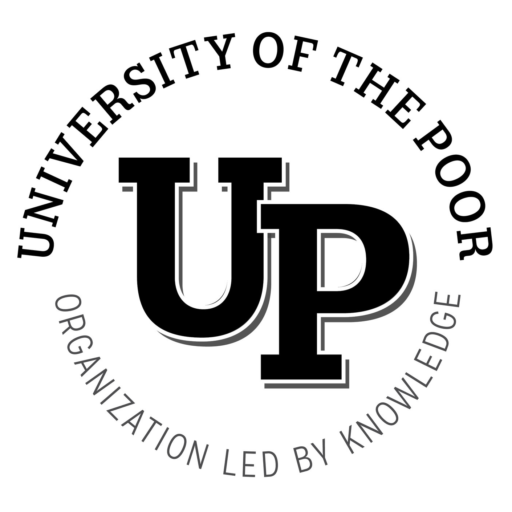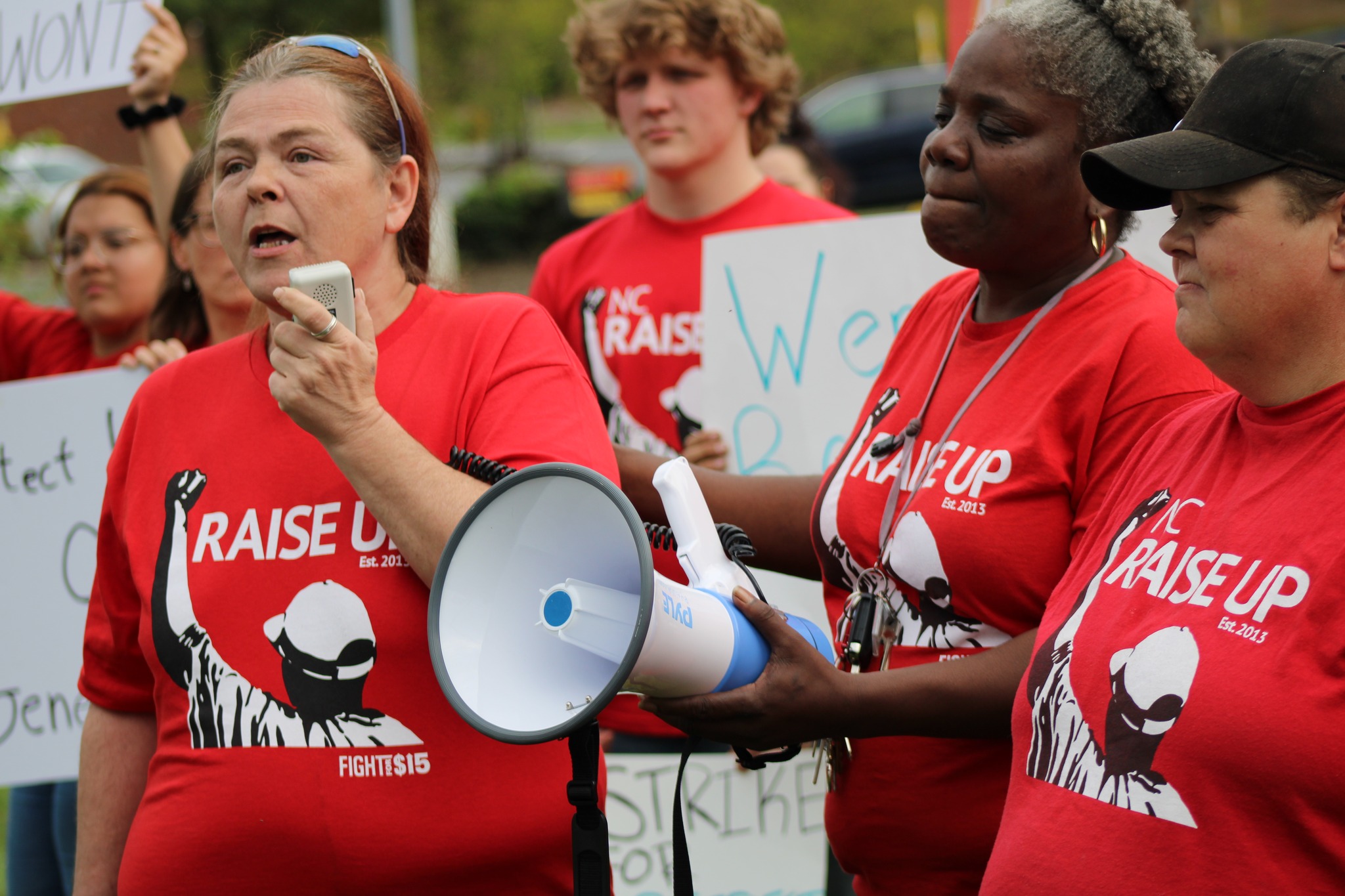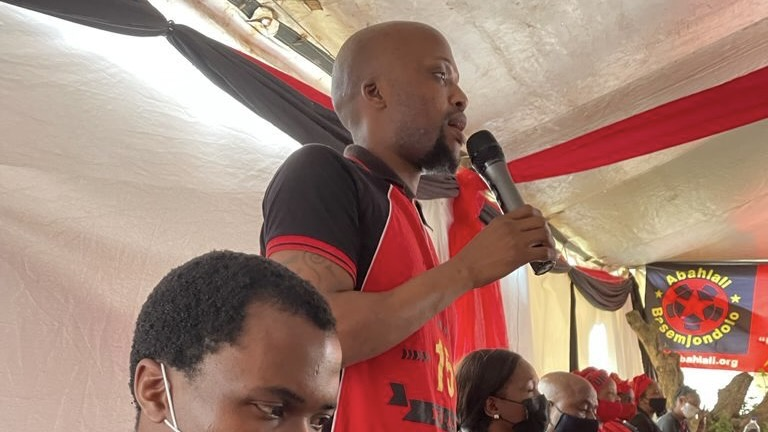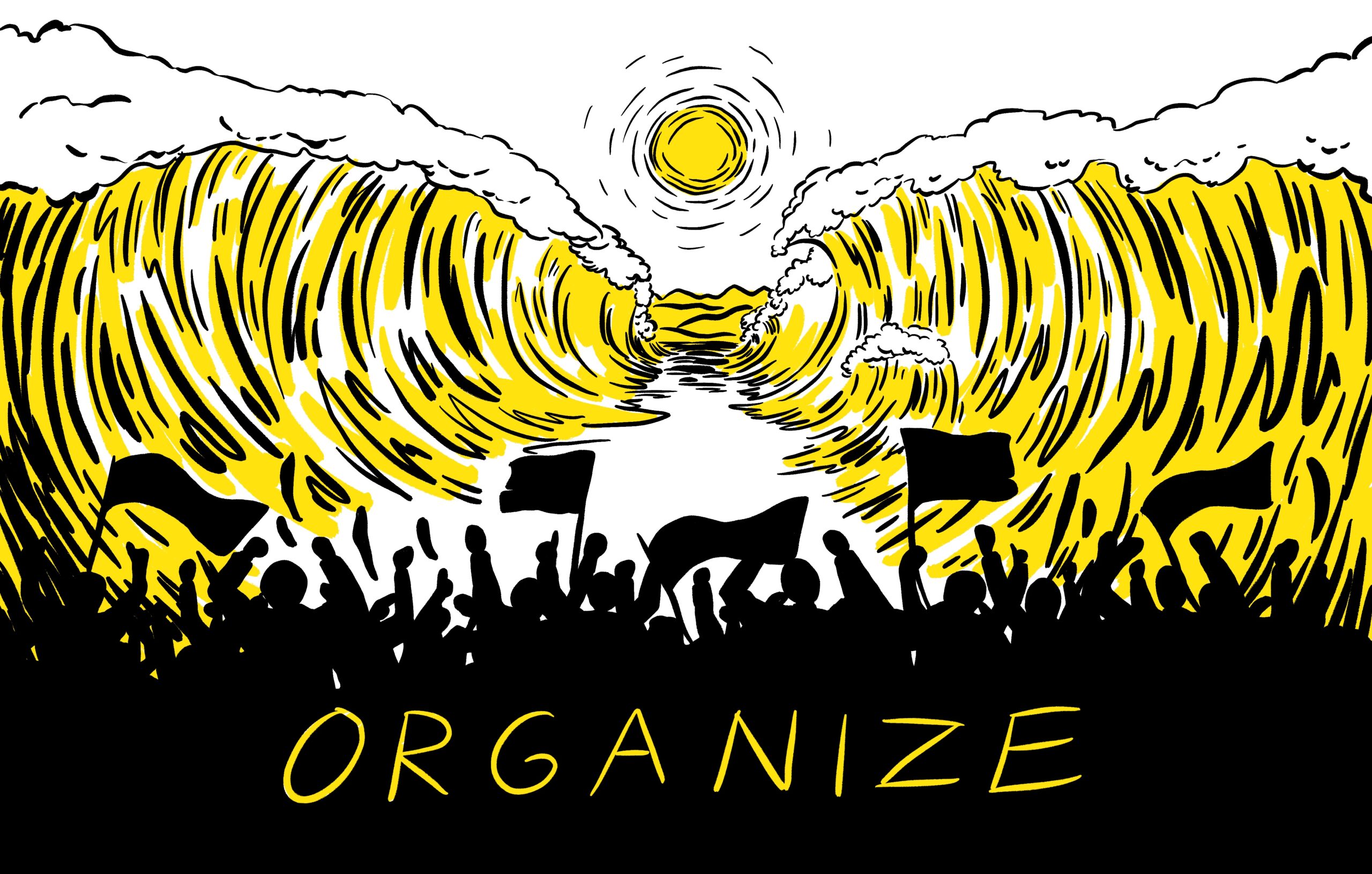Below is an interview between University of the Poor member Dan Jones and Ben Wilkins, the director of Raise Up the South. The interview has been edited for length and clarity.
DJ: What is Raise Up?
BW: Raise Up is a workers organization, really a union, but not a traditional labor union in the sense that we’ve come to know it in the United States. It’s an organization that unites low wage workers: People who are working mostly in service jobs, primarily the fast food, the long-term care industry – like nursing homes and home health care – and retail. Other industries too, but those are the three primary ones.
Raise Up has existed since 2013, and really we do two basic things. We build regional or city-wide chapters of these very broad assemblies or organizations of low wage workers and we organize at the workplace in a direct-action oriented manner. Something that probably sets us apart is the Southern focus of our work, but also the commitment to joining together economic struggles with political struggles, and trying to broaden the conception of what it means to be a trade union. By “political struggles” I don’t just mean elections. I mean the fight for a whole new vision for how society works, rather than just improvements on single issues like wages or benefits.
DJ: Could you say a little bit more about why that is the base that y’all organize? Why low wage workers?
BW: Low wage workers are incredibly fundamental, and when you’re talking about labor, they are the social force that can fundamentally transform this country. The position of people who are working in jobs at places like McDonald’s and nursing homes and Amazon and Walmart means that they really are that kind of new and unsettling social force that Dr. King talked about: The poorest and most exploited, dispossessed section of the population. And I think that’s really the sector of the population that can fundamentally call into question the entire organization of the society and the entire system. And so it’s critical to organize that group.
When we think about who can make a decisive impact, not only in leveraging their power on the job but also transforming the entire society, in our opinion, it’s the lowest wage workers, the poorest workers in the economy. That’s the social force that can transform the country.
In terms of the labor force in this country, the trend has been a pretty big reduction of manufacturing employment. And there has been all this growth of these service jobs. And so parts of just everyday human existence that throughout the history of capitalism were outside the sphere of profitable activity – like making food and caring for elders – that’s all become commodified. And it’s really that low wage workforce that is doing that work in places like McDonald’s. Just the fact that something like taking care of infants or caring for the elderly is now a commodified activity, I think it says a lot about the last 50 years of our history in this country. And there are people who are doing that work, and that’s really the low wage workers.
Another thing that’s critical about low wage workers is that we believe it’s really important for an alliance to be made between the poor and working people in the Global South, and workers and poor people in this country. And I think there’s a more intimate connection between say, a homecare worker or a fast food worker, with people in South Africa and Brazil and India, and all the places where these really critical struggles are happening. And that kind of connection is important for us.
And it’s also that low wage workers have nothing to lose but their chains. They have less to lose and more to gain from a fundamental reconstruction of society. In my experience, ruling class ideas in this country are weaker among poor people and low wage workers. Most poor folks have pretty radical ideas. And they’re contradictory: there’s plenty of influence from racism and from other ideas that go against the interests of workers. But also, there’s a real fertile mental terrain among the poor, for talking about a total reconstruction of society. Low wage workers are also a group that’s much more multiracial, that tends to be a higher proportion of Black workers and rural workers and Southern workers and immigrant workers.
It’s just the biggest group also, if you’re talking about labor. Even despite all of the victories that the Fight for $15 has had in terms of raising wages, one third of all workers still make less than $15, and it’s much higher in the South. And $15 is not even really the line anymore: When we’re talking about what’s a living wage, it’s more like $20 or $25. Most people who work get really shitty low wages and do these service sector jobs. So just in terms of pure numbers, it’s the most important group as well.
DJ: Having identified that base, could you say why y’all evolved this approach to organizing that combines both work at individual workplaces with neighborhood and city-wide organizing? Does that approach flow from organizing this particular group of workers?
That’s probably my favorite thing to talk about. Our approach really does flow from that particular group of workers. It’s interesting to read past theorists on the trade union question: One point that many thinkers have made is that the formation of unions in capitalist society really mirrors the economy and the productive process. And so, in factory society, you had these really massive, industrial centers of production, and the unions were built to reflect that.
So, the way we built our organization really is a reflection of the living conditions and working conditions of fast food and care workers. And what I mean by that is that, for an average member of our union, their relationship with their employer is not fundamental. It’s their relationship with the struggle just to survive, and working as a part of that. Folks are working at McDonald’s one week, Amazon the next week, Walmart the next week. Sometimes literally week by week having different jobs. And the industries are designed in that way. It’s a part of neoliberal development, to create this kind of labor force that’s extremely elastic and flexible, with high levels of unemployment and precarity.
So it wouldn’t really make sense to build a traditional union, meaning a purely worksite or employer-based unit that is negotiating with an employer over wages and working conditions. I think that works in many places, like a school system or a big hospital, where you’ve got people who work there for years and years. But it just doesn’t really reflect the kind of conditions and the circumstances of these workers and if we were to organize that way, we would be constantly having this churn of members. So some of it is just a kind of nuts and bolts sense of how we stay in touch with the workers, and we can’t stay in touch with folks if we just organize at one worksite.
And there’s a really strong tradition of what Reverend Nelson Johnson at the Beloved Community Center calls community unionism, which is a term I like, or others have called political or social movement unionism. And that tradition was broken after the Cold War period. People talk about the 1930s, but even in the mid- to late-1940s you had these really incredible, significant uprisings of industrial workers. And in many places, millions of workers were going out on strike after the war and there was this really substantial, spontaneous kind of economic militancy among workers. It was deeply connected to this tradition. Civil Rights Unionism, by Robert Rodgers Korstad, is important for people to read to grasp this concept: They were building trade union organizing, based at the factory, but which was about so much more than that.
One of the best Southern examples of that was the tobacco workers union in Winston-Salem. There you had this interracial union of tobacco workers in North Carolina in the 1940s. These were very poor workers, primarily led by Black women. But they also had a really substantial membership base of white workers. With the stereotypes of “poor whites,” you wouldn’t necessarily expect this but it was incredibly powerful. And the organizing was about winning better wages and all that, which was the foundational element, but then building from there was a political project that was about changing the entire structure of society: far reaching political, social and economic change.
That kind of unionism was absolutely unacceptable to the ruling elite in the post war period, and it was crushed through the mechanism of the Red Scare and McCarthyism and these massive purges. Another good example is the International Harvester union, the farm equipment union in Louisville, Kentucky. That’s where the civil rights leader Anne Braden got politicized. It was another Left-led union that had powerful political aims, and that was building multiracial unity among workers. And it was crushed, too. The purpose of the purges and the crushing of those unions was really to drive a wedge between the economic movement and the political movement.
There’s been a lot of important efforts to kind of reunite those two pieces of the struggle, but this constraint on unions has really persisted in the labor movement since those days. You don’t see unions, for example, taking a stand on war, which is something that unions used to do all the time. And there’s all kinds of other examples like that: Not taking positions on “controversial” political issues.
A lot of what we’ve been doing in thePoor People’s Campaign: National Call for a Moral Revival” is actually trying to revive that tradition, not that it was ever perfect, but to revive that tradition of a union that marries the economic, political and ideological struggles.
DJ: You pointed out that throughout the whole history of the labor movement, and the trade union movement in particular, there have been these different polarities around the purpose of the union: To deliver kind of bread and butter successes, organize to negotiate better conditions and a better standard of living from the employer, versus folks who have always seen the unions connected with a political struggle. And you also talked about some of what is new about labor organizing in this period, with low wage workers: Does that change in the section of workers you’re focused on and on how the union has to organize also impact how you bring together the economic struggles with the political struggle?
Everything I just said about why we organize low wage workers is true. But there’s a question that gets raised: “Where’s the source of power?” And I think there’s a very traditional way of talking about worker power that you still hear: The power at the point of production, and the ability to stop the economy. It is a real, important question to actually grapple with: How do fast food workers, how do care workers, exert power? We can’t really do something like the Flint Sit-Down Strike that was part of the CIO movement today, even though that was an incredible, important struggle. There’s some sectors of the economy wherestuff like that is very possible, but what we’re trying to build is a much more broad form of power that’s not so much about the factory floor or stopping the choke points. There’s some choke points, but there’s a diminishment of their role, at least in the US. So we have to think about exercising power in a much broader and more comprehensive way.
There’s a real openness to building a new conception of what it means to be a union – specifically among low-wage workers. And especially in the South, it sounds a little weird but there’s a great opportunity because there’s not much of a pre-existing union structure there – although there is a vibrant movement among those who are unionized, and the tradition of worker struggle in places like North Carolina is still alive. There are much fewer unions in most of the South than in the rest of the country: In North Carolina, 2.6% of workers are in unions. In South Carolina, it’s 1.7%. And in Alabama, it’s 5.9%, and that’s high for the South. So it’s fresh terrain, and I think the possibilities are endless to build something new.
DJ: It makes me think of what we’ve often said about some of the homeless organizing, which is that in this struggle for housing and for the right not to be homeless, folks are just immediately up against the state. And so you have something you could call an economic struggle around people’s standard of living, but it actually immediately puts people into a political struggle and requires political organization. Because of the structural erosion of traditional sources of power for working people, a trade union organization or labor union organization more and more has to verge on a political organization of the poor to be able to exercise any kind of power.
I agree with that, and we still believe in the power of organizing around the question of labor. Labor is a fundamentally human activity, and it’s totally degraded in this society. You really saw this revealed with the COVID-19 pandemic: The people who do the most important work are the most disrespected, the most degraded, the most poor. We were doing this training in Atlanta for new organizers, and we were talking about work. And I asked: “Who likes to cook?” And lots of people like to cook. But not when you’re working at McDonald’s, then it sucks. That’s a simple thing, but I do think it’s really important: building a new vision of what dignified labor would look like. Dr. King spoke really eloquently about that.
There’s the development of all of these labor saving technologies: That’s obviously a really critical economic fact. But on the flip side, you could argue that there’s a massive shortage of laborers and of labor in this country, or put another way, there is so much more work that needs to be done for America to be a decent society that values human beings. We need millions more child care workers, we need millions more teachers, we need millions more workers in all these critical jobs, but they’re not valued by society. What would it look like to build a labor movement that is saying, we need dignified labor for all people, because it is such an important part of being a human being? That’s the kind of labor movement that needs to be created. And it’s not just purely about winning concessions from the bosses. It’s about thinking about the role of labor in society in a whole new way.
DJ: You mentioned the training in Atlanta, which is part of the expansion that Raise Up is carrying out right now. And earlier you talked about the fertile and relatively open terrain in the South. What are the other reasons your organizing focuses on the South? You’re expanding beyond North Carolina right now – but you’re not expanding to California or Michigan or New York, you’re expanding to South Carolina and Georgia and Alabama. Why?
Throughout US history the South has been the pivot of American political development. And I think that continues to be the case, even if it looks different now than it did 150 years ago. Most of the progressive forces and labor and the Left have developed and built up on the coasts and the Northeast, and to some extent the Rust Belt. But I think that history teaches us that mass movements in the South are really what catalyze broad social transformation nationwide. And that’s happened again and again. It happened during Reconstruction. It happened in the 1960s. You couldn’t imagine all of the movements of the 60s, not just the Civil Rights Movement, without the Montgomery Bus Boycott happening. And on the flip side, the South is the bedrock of reaction in this country. All you have to do is look at the makeup of Congress, and, the composition of the electorate and where do the most regressive, anti-people policies come from. Not just today, but going back through history. So that’s the contradiction: that on the one hand it is this base of reaction, but within that it’s the most fertile ground, I think, for making really broad transformative change.
Right now there’s an authentic commitment to building something in the South, to building political power in the South, generally speaking, across the progressive milieu. And it’s going to be pretty significant. The old South really no longer exists. And there is a new South that has risen, but superimposed on a lot of the old contradictions. There are these major metropolitan areas that look exactly like any other major metropolitan area in the country, and that didn’t really used to be the case. The South was a very agricultural place. Charlotte, North Carolina is a great example. It’s totally dominated by finance and tech, mostly finance. Raleigh-Durham’s very dominated by tech and higher education. The Democratic Party is in power in those places.
And then you have this force, drawing support from the middle strata, with white racism and the reactionary politics of the extremist wing of the Republican Party, that still has a very tight grip on power. They’re the political descendants of the Dixiecrats and of the the slave power going back to the 1700s and 1800s. And that’s the power base for Trumpism and for all these far-right Republican forces, which are in power at the state level. And the constitutional system of this country has created this situation where those folks are able to exert all of this power over the metropolitan areas. So, in a place like North Carolina or Georgia, you’ve got these incredibly regressive state governments, but you’ve got these massive cities where the population is more Democratic, to talk in terms of major parties.
Our goal at Raise Up is just fundamentally different from the goals of the different sides of capital right now. One side’s goal is a South dominated by tech and finance. The other side’s goal is a South dominated by the military and extractive industries, with awhite racist power base.
Our goal is obviously quite a bit different than either one of those. There’s a third force, which is really the poor and the working class, and it’s disorganized. And that group has not been able to build significant power. There is a huge opportunity to do that. That’s the social force that is mostly voiceless. There’s been efforts: Moral Mondays, the Poor People’s Campaign and many other movements are working towards that, and we’re trying to do that. But if we’re honest, none of us have really serious power at this point. But the opportunity to build that social force is tremendous and would really rock the boat.
That’s the other thing that’s been kind of amazing about Raise Up: We’ve got this really incredible work in western North Carolina, which is all poor white. That’s Madison Cawthorn’s district, who’s probably the most right-wing Congressperson. And we’ve just got this incredible group of workers, and seeing that kind of relationship built between our Black membership base in Durham and that white membership base in Appalachia, it’s been really powerful and instructive. And I think that, just at a fundamental level, is really the answer.
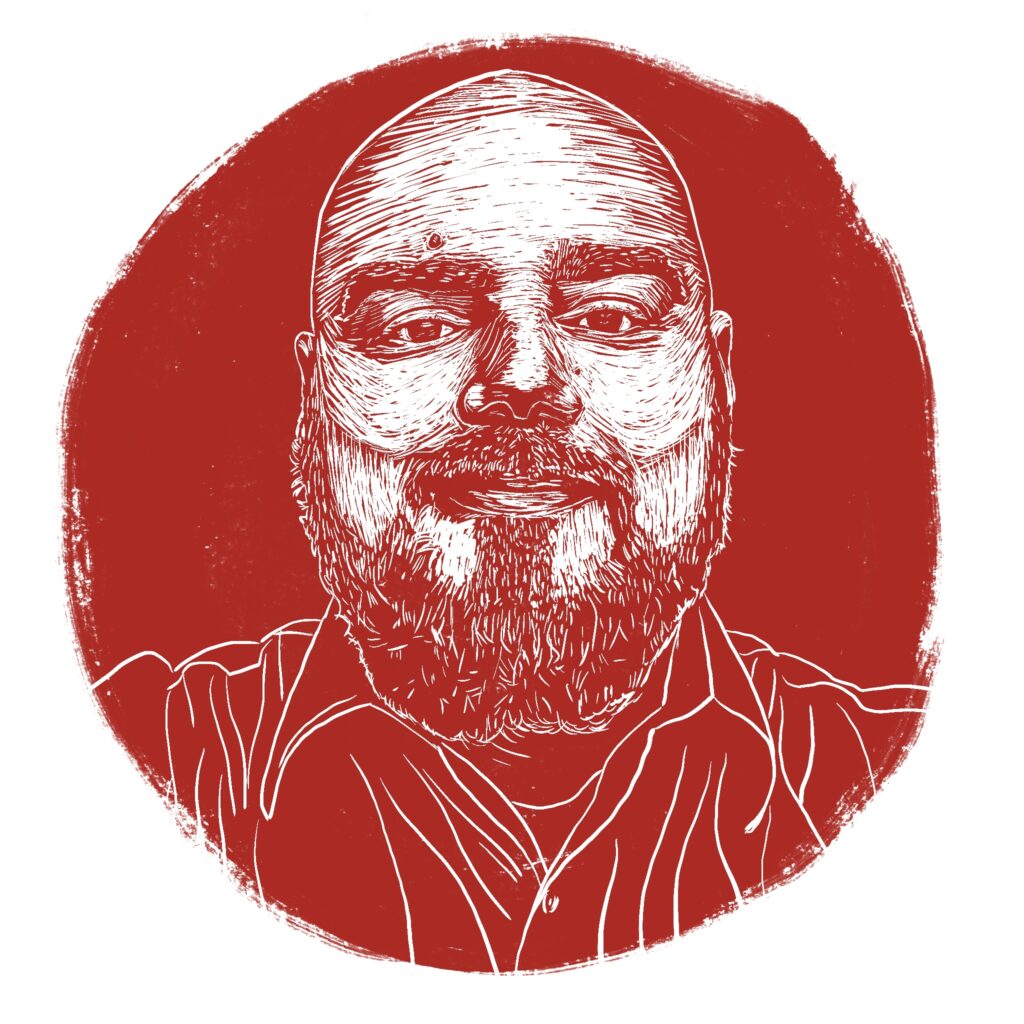
Ben Wilkins has been an activist and organizer in social justice struggles for over 20 years. He began his work as a labor organizer in Detroit, Michigan, where he worked for the healthcare workers union. Since 2013, he has been the director of Raise Up the South, a union of low wage workers based in North Carolina. He is also the editor of the forthcoming book, Anne Braden Speaks: Selected Writings and Speeches, 1960-2006 (Monthly Review Press).
